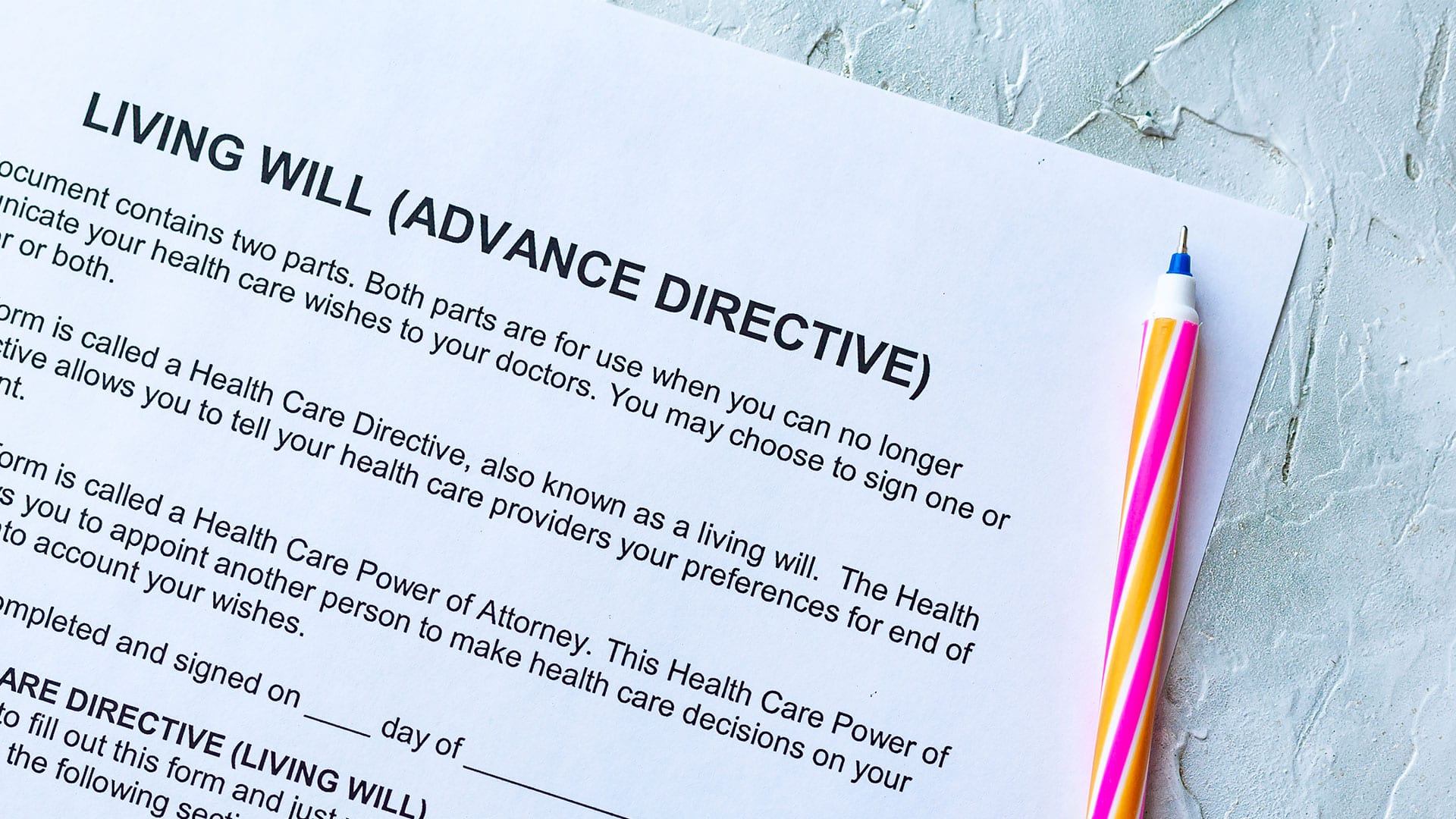Life is full of unknown variables. Whether you are faced with a life-threatening illness or planning for the future, you can ensure that your end-of-life wishes come true with advance directives.
What is an advance directive? How can it guarantee your wishes will be met?
This blog will familiarize you with various end-of-life decisions and outline how to complete an advance directive.
Thinking About End-of-Life
Your final days should be about you and your goals. Do you want to prolong your life for as long as possible? Would you rather focus on your quality of life and make the most of your final days? Deciding what you want is the first step.
As you determine your goals, you’ll want to think through specific scenarios and decide what type of life-sustaining treatments you would want. What if you go into a permanent coma? What if you have paralysis or brain trauma after a stroke or illness? Would you want to prolong your life, even if it meant being connected to a machine?
Consider if and when you’d want these options.
- Resuscitation. Doctors will use CPR to try to restore your heartbeat if your heart stops. Medical staff may use force or a defibrillator.
- Ventilators. If you are unable to breathe due to illness or surgery, a ventilator will help you do so.
- Artificial nutrition. You may require a feeding tube or IV fluids if you cannot eat or drink.
- Hospice care. How do you want to manage your symptoms? Hospice care aims to give you peace and comfort during your final days.
- Organ donation. If you wish to donate your organs upon death, note that doctors may use machines to keep your organs functioning until they are ready to remove them.
Once you’ve thought about what you want, you’re ready to complete an advance directive!
Advance Directives 101
An advance directive is a legal document that ensures your wishes are carried out, even if you are unable to voice them. Healthcare providers typically consult spouses, parents, children, or siblings when patients are unable to communicate. Advance directives take the burden of decision from your loved ones. If necessary, your advance directive will speak for you.
What is Included in an Advance Directive?
An advance directive can serve two purposes. It can act as a living will and give someone you trust the power to make medical decisions on your behalf.
Living Will
As living wills, advance directives instruct medical staff on how to treat you if you are dying, permanently unconscious, or incapacitated. An advance directive form will ask which procedures you’d like withheld from your treatment. You’ll be able to designate if you want feeding tubes, IV fluids, CPR, dialysis, ventilators, radiation therapy, or antibiotics.
Durable Power of Attorney
You can also legally appoint a healthcare proxy in your advance directive. With a durable power of attorney, your proxy will be able to make medical decisions on your behalf if you are unable to communicate. Your proxy should be someone you trust to make decisions that correspond with your wishes.
You can choose to write down your wishes, name a healthcare agent, or do both. Advance directives never expire, and you can change or revoke your advance directive at any time.
Do Advance Directives Have To Be Notarized?
You don’t need a lawyer to fill out an advance directive. However, you must have your advance directive notarized or signed by two witnesses of at least 18 years of age to be legally valid. It’s suggested that your witnesses not be related to you.
Advance directives vary by state. In Missouri, advance directives must be signed and notarized to provide a proxy with power of attorney. If you are only recording your health care choices, you must sign the advanced directive before two witnesses. Missouri residents completing both sections must go through both processes.
Once you complete your advance directives, you should give copies to family members and your hospital.
What else do you need to know about advance directives?
Advance directives are not always valid in emergencies. Emergency medical technicians (EMTs) are required to perform CPR and other life-sustaining treatments unless provided with a separate order. In the hospital emergency room, medical staff may be unaware of your advance directive before administering treatment.
You may consider the following orders for emergencies:
- POLST (Physicians Orders for Life-Sustaining Treatment) form. EMTs do not act according to advance directives; they are required to prolong your life however they can. With a POLST form, you can let emergency personnel know not to provide specific life-sustaining treatments.
- Non-hospital DNR. Regular DNR (do not resuscitate) orders are only valid within the hospital. A non-hospital DNR is directed at 911 responders, who are required to prolong life. This order tells EMTs not to perform CPR.
Live Out Your Days with Comfort Care
End-of-life doesn’t have to be focused on medical care and machines. Once you’ve filled out your advance directive, it’s time to think about the comfort care you want to receive in your final stage of life.
Hospice can help you live out your days in dignity. At Seasons Hospice, we believe everyone should receive hospice at no cost to them. We provide free symptom relief, personal care, and non-denominational spiritual guidance to our patients.
Do you want to find out more? Contact our team at Seasons today. We’re always available to discuss how hospice can benefit you.
Ready to fill out your directive? Find the durable power of attorney health care directive distributed by the Missouri Bar here.







